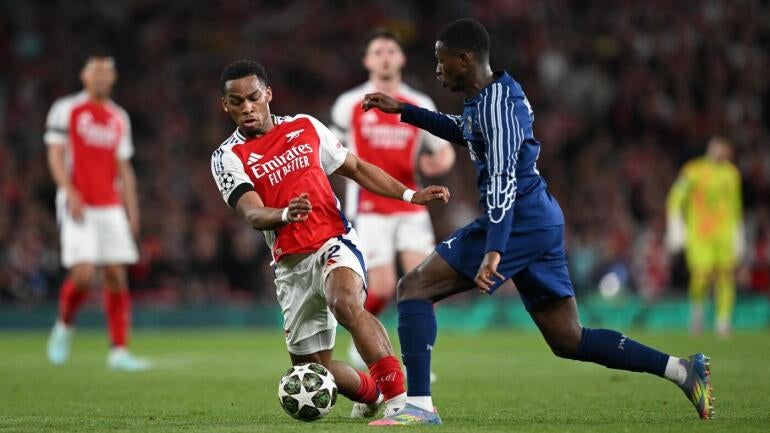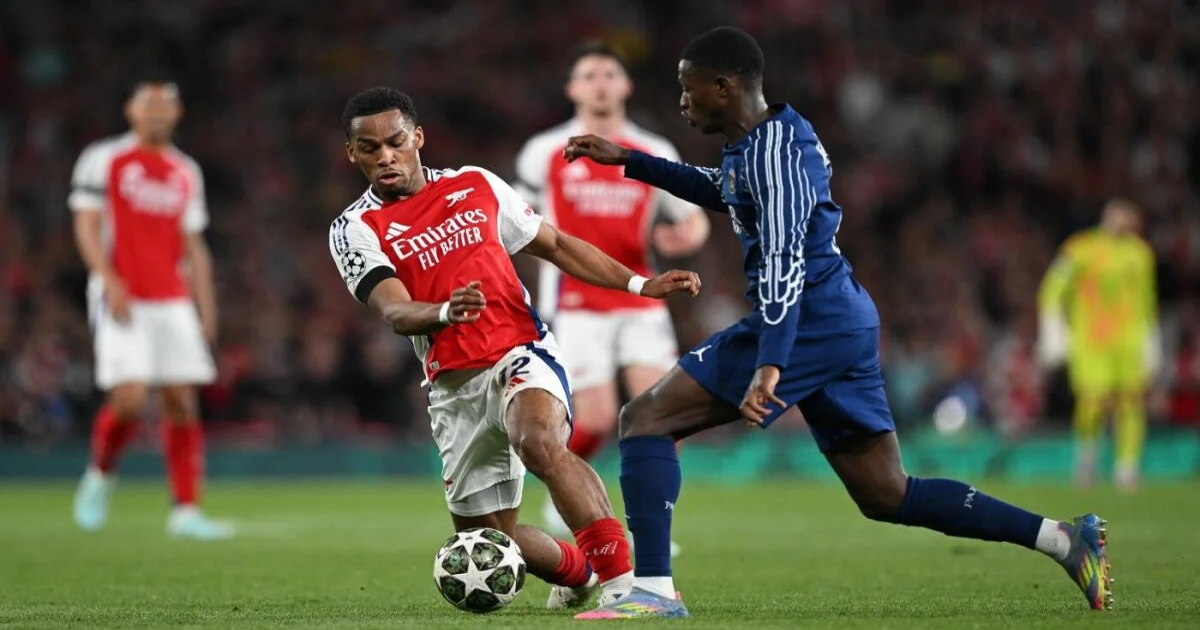
Getty Images
LONDON — For the last two years, the defining trait of Mikel Arteta’s Arsenal has been apparent to anyone giving them the most cursory glance. They will absolutely monster the other team in the duels that matter most. That memorable berating Arteta gave his side in the winter of 2022 has wormed its way deep into Arsenal’s subconscious. When his players lose a duel, Arteta is upset. Woe betide those who displease their manager.
In almost every game since the arrival of Declan Rice, Kai Havertz and Jurrien Timber — three of the great one-on-one scrappers of this team — Arsenal have executed their out-of-possession plan to a tee. In the middle of the pitch, they prove to be too big, strong, and agile for their opponents. Then the ball goes out to the flanks, and their fullbacks apply the chokehold. This was battle-proven at the very highest level: Arsenal have just locked up Vinicius Junior and Kylian Mbappe after all.
For a quarter of the first half of this tie, one of the most powerful out-of-possession sides in the Champions League lost the run of itself. There’s a reason why Arsenal talk about the Timber penitentiary. When their right back has locked in this season, no one is escaping. The best left-wingers in Europe would have more success busting themselves out of Alcatraz.
Maybe Khvicha Kvartskhelia is just better than all of them. It wouldn’t be much of a reach to claim as much. In those opening exchanges, there was no stopping the magnificent Georgian. Timber couldn’t cuff him before he poked the ball back to Ousmane Dembele for the opener. The young Dutchman was lucky that Slavko Vincic was unmoved by appeals for a penalty when he had his arms all over PSG’s No. 7.
It would have been one thing if this was just Kvaratskhelia blowing by his man. Everywhere across the pitch, Arsenal were being overwhelmed. Dembele’s movement befuddled the backline. Vitinha had bristled Monday at the suggestion that PSG didn’t have the muscle to match their hosts. If there is a glass jaw in this midfield, it doesn’t matter when the trio are sliding in with such precision and power.
Every attempt to play out of PSG pressure brought four or five backwards passes before an agonising, by the skin of their teeth escape. Arsenal’s own press was a step too slow, allowing Nuno Mendes to slip a ball through midfield to Dembele, setting the Parisians on course for the game’s only goal.
Through the first 23 minutes, the hosts had won just 26 percent of their duels. Arteta wasn’t upset. He, his team, a crowd that had delivered the atmosphere demanded of them and then some, all were shellshocked. You could see why he had asked the Emirates Stadium to bring their shirts, shorts and boots. Maybe with another 57,000 options out on the flanks, they could have played their way around the PSG press.
It would not stay like this. Luis Enrique’s side couldn’t harry with the same intensity, and anyway, Arsenal refused to enable that. Hit it long, win the second balls, build from inside the PSG half. There might have been more to it. Arteta acknowledged there was “one issue that we corrected after 15, 20 minutes.” Fixing it turned the game around, he said. He would not explain what the change was.
“Not a lot [was going wrong],” Arteta insisted. “I’m telling you it was very specific but very important, especially the way we play. We corrected it. It is not easy to correct it constantly, but we did it and we were much better.”
Whatever he did, it really worked, and for much of the hour that followed, this was a totally even game. Mikel Merino’s header off a Declan Rice free kick might have been offside — as were two Gabriel Martinelli openings that didn’t quite find the net — but Leandro Trossard went close to beating Gianluigi Donnarumma. A few more lucky bounces too and they might have got their equalizer, though they were certainly fortunate that the refusal of Bradley Barcola and Goncalo Ramos to take prime shots on their weaker feet cost PSG a second.
Come the second leg, it is fair to assume that Timber won’t be roasted quite like he was in the early exchanges. Of his first eight duels, seven were won by the opposition. Of the next five, all ended with Timber victorious. William Saliba, too, grew in authority, an incredible tackle on the hour denying a rare PSG dart into the box. Add Thomas Partey to this side and the road through the PSG press may not be so dangerous. That also allows for Merino to go up top and some proper ugly on the eye, easy on the buildup long ball football. It can work.
In the 67 minutes that followed those early beatdowns, Arsenal won 55 percent of their duels. Aerials, 72 percent. You might not like it, but this is what peak Arsenal performance looks like.
When that all clicks together, Arsenal are a match for PSG. These two look like they will deliver a semifinal that is consistently absorbing and finely balanced. The problem, however, is that we all know how these sorts of ties get decided. Tickets to the final are routinely snatched from the team who has that one bad run of moments. In that moment where their defining trait was nowhere to be seen, it feels like Arsenal might have had theirs.
